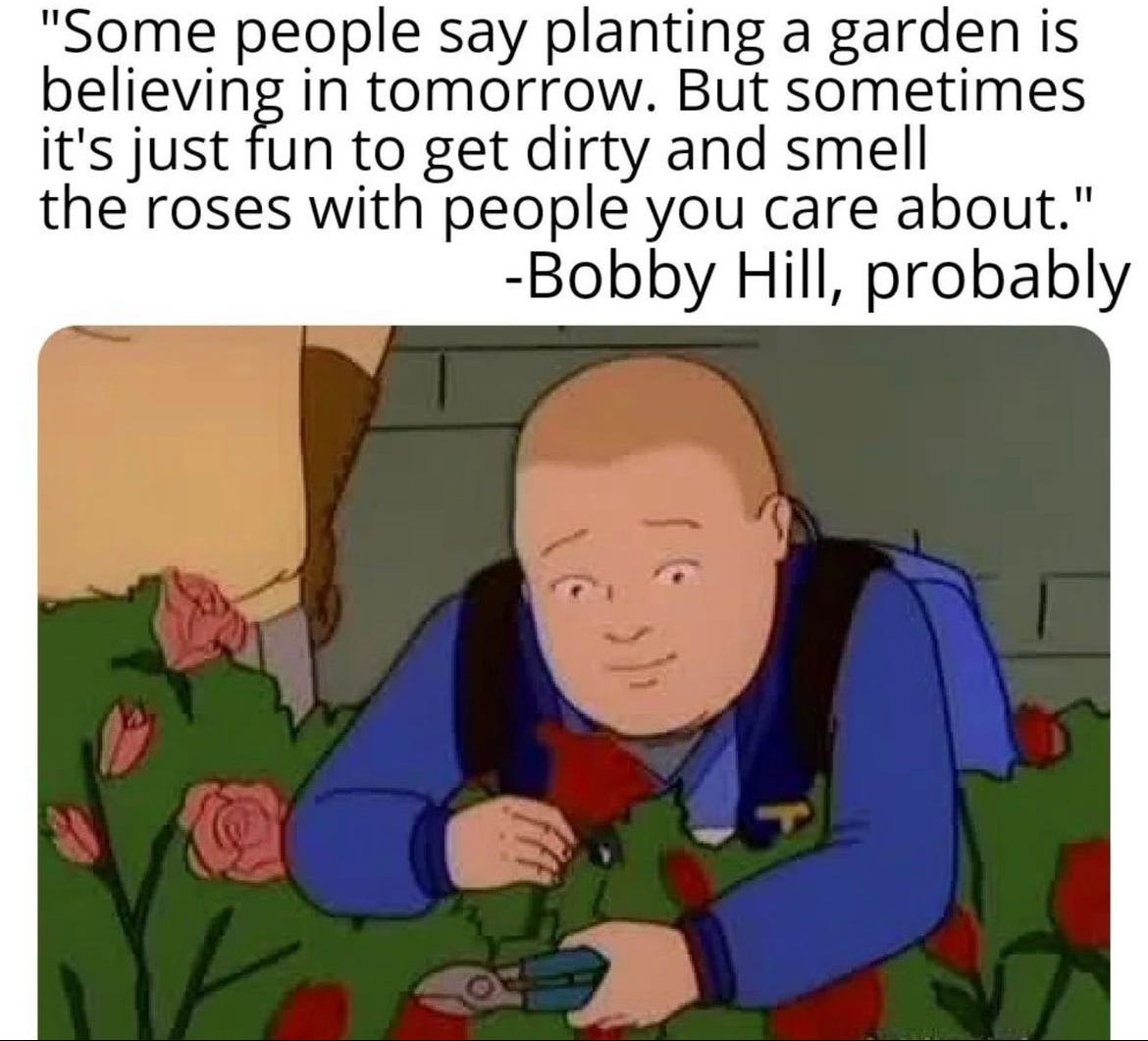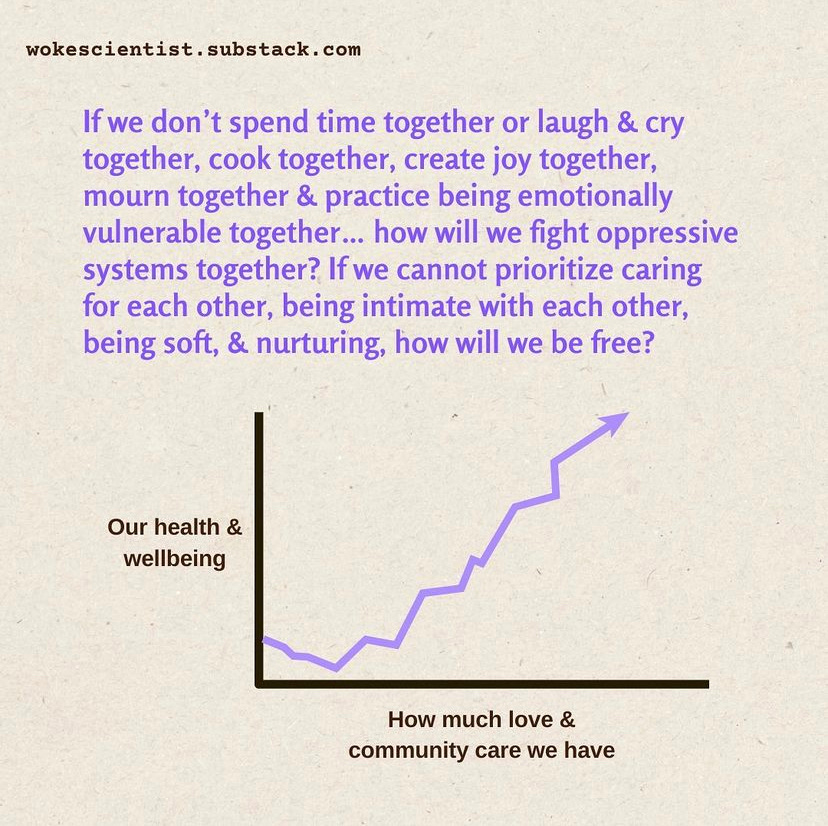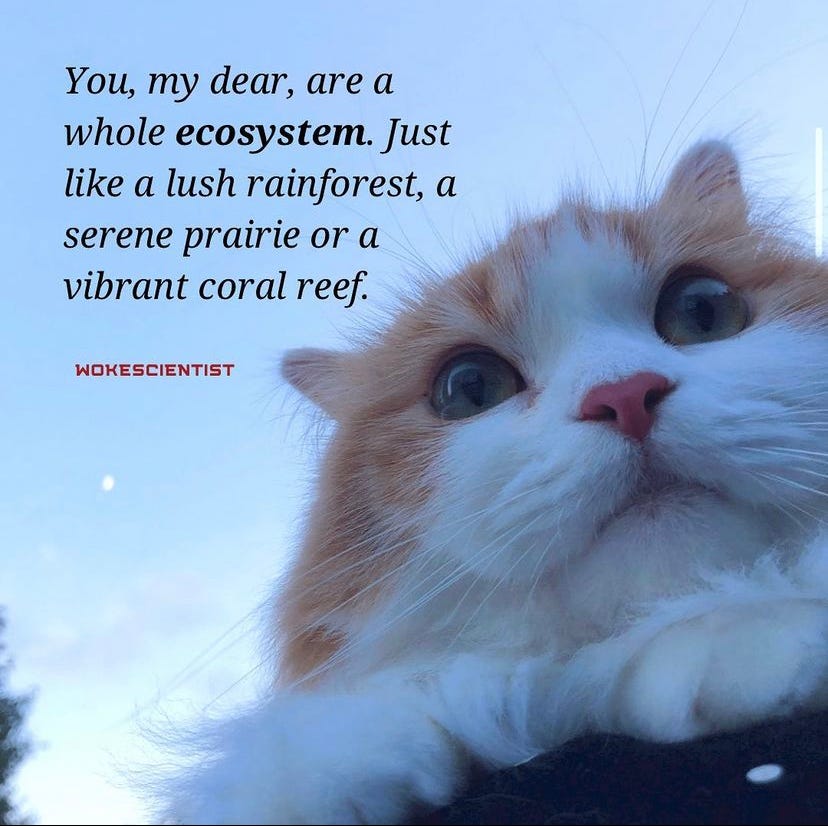On community, privilege, and culture with the Woke Scientist
A conversation about reimagining care, deconditioning from capitalism, and flowers growing through concrete.
Yesterday I googled “How to reduce worry in the city” because lately, I have been feeling a little overwhelmed about life in the city. I don’t know if it is me getting older or the constant reminder of capitalism that the city throws at you (consume, build, grow!), but I have been struggling. After months of auto-analysing and worry, I realised I am probably experiencing what indigenous communities and displaced people have experienced for a long time: the grieving of land and future generations at the hands of capitalist and colonial greed.
Google replied: “One way to reduce a sense of being overwhelmed is to expand your idea of home into the immediate neighbourhood in which you live. Make a point to visit the local shops, trade banter with the shop owners, and try out nearby restaurants. Familiarity breeds comfort, which may help lessen anxiety over time.”
This tender response made me understand the power of community as a tool for deconditioning from capitalism. Lately, I came across the work of someone who has helped me reframe conditioning and constantly question myself with care. Ayesha Khan, known as the Woke Scientist, is an Infectious Diseases Scientist, Germ doctor, grassroots organizer, writer, astrobiologist & educator discovering the science of social justice, decolonization, collectivism, neurodiversity & liberation. Her newsletter Cosmic Anarchy, and the work that she does one on one with folks exploring how we can decondition from colonialism and capitalism are a unique infusion of education, activism, and care. Khan is a poetic antidote, without a doubt.
When I confessed my city blues and told her I want to just go live in nature, she was compassionate yet highlighted the privilege involved in being able to leave the city. She, as a doctor, is tied to the city, which is overwhelming, especially with the awareness that she has about systemic issues. Fostering community or doing pleasurable things like cooking a traditional meal is usually what gets her to come back to her body, “It’s not only about what we are trying to tare down, or what we are living against, it is about what we are trying to build, what we are for,” she says.
Ayesha is a force of nature, she speaks with honesty and boldness, and her awareness is fertile ground for a lot of anger and frustration. But she manages to infuse care and compassion towards herself and her activism, and this is admirable. I trust her expertise and work in deconditioning and decolonization as a necessary guide for many, and this is why I wanted to share this important conversation with you.
Deconditioning work is about questioning, and this also means yourself, in a compassionate way. For example, when I say I want to leave the city and live off the land, what do I need to reckon with? “We need to understand the individualistic pipe dream,” Khan says “ Only thinking we can just go outside and live off the land is ultimately a more individualistic, idealized version of building castles in the air because the reality is that our communities are here,” and our job, I add, is therefore to ask other questions: How we can connect our cultures and the rest of our ecosystems even within the framework of the city? So we begin to think.
For me, the epitome of fighting with beauty in an oppressive system is a plant that grows through concrete. “There is an extended struggle going on outside our windows. You can’t stop life, no matter how much industrialism tries to. Noticing these things, or the flowers blooming, or the trees in the wind,” is a way to connect, says Khan.
“That’s how capitalism has conditioned people to see everybody, as a means to an end. And we need to think about how to create equitable reciprocal relationships”.
Ayesha Khan
Khan tells me that other than these visual queues, fostering community and countering the individualistic nature of a capitalist society is fundamental. “Community has become desecrated. And it’s worse in the heart of empires, I think it's worse in the US, Canada, and Europe,” she says “and it’s really sad because people need connection but everybody's so individualistic and still focused on the pursuit of success that they just fabricate community in these really distanced removed ways that are not real.”
I recognise these patterns in a lot of friend groups around me, the exchanges are often transactional, meet people to make or consume things, and how really meaningful places are often the communities where we get together to simply elevate each other, to spend time together without a gain. “That’s how capitalism has conditioned people to see everybody, as a means to an end. And we need to think about how to create equitable reciprocal relationships”.
In bell hook’s All About Love, hooks borrows Scott Peck’s definition of community as a coming together of a group of individuals “who have learned how to communicate honestly with each other, whose relationships go deeper than their masks of composure, and who have developed some significant commitment to ‘rejoice together, mourn together,’ and to ‘delight in each other, and make other’s conditions our own.’”
“I think people have this white sterilized, sanitized, capitalistic version of relationships, which is not relationships to me,” says Khan “It's just everybody treating each other like an object. Even if you're drinking with someone, how much are you really seeing their humanity? And are you really getting to talk about things beyond the superficial layers of what you're pretending to be?” she explains with fervour. “It comes to sharing joy and pain. It takes people to actually think about how to build that kind of community. And that is the struggle, to find the right kind of community”.
I have reminded myself of how my choice of communities has changed throughout the years and how I have come to prioritise certain relationships. In moments of crisis and pain, true community and connection are what save us and bring us to the present moment, I have experienced that. Being in a community authentically requires a level of vulnerability that many are not willing to get into, and I wonder if this has contributed to the hierarchy of relationships that has been created under capitalism (the nuclear family, romantic partner above all else).
“Capitalism is the absence of culture, a total absence of anything meaningful. Relationships are viewed through the lens of ownership and possession,” says Khan “ That’s how capitalism has socialised most people, but it's very different for people that have more of a collectivist cultural context, to begin with, where we actually have cultural traditions and spirituality, which force us to exist next to other people and actually participate in creating meaning.” I stop for a moment to process this sentence and find myself reminiscing on what it is that throughout my life has kept me away from a communal experience, how conditioned I am, and how I am willing to show up in a community in the future. “I think the problem is people view relationships between two human beings as though they occur in a vacuum, independent from the land, from culture, from ancestors,” they add.
As Khan speaks, I wake up to the fact that privilege and wealth inevitably isolate us because support is not found in the community but can be found by simply paying for services. Community in capitalism is often sought in a moment of crisis usually, and I realise that what fosters community in a more proactive way is to foster culture.
Without our attachment to culture, there is a risk of reducing our personality to our jobs or what we do. “People need to be asking themselves: what does culture mean to me?” they say, adding that as long as the colonial narrative that white people don’t have a culture but have to appropriate it elsewhere, we will not be collectively free. We see this happening everywhere, from yoga being appropriated out of place, to tipis being built to host cacao ceremonies led by people with no connection to the roots of these traditions.
Culture is appropriated when the detachment to one’s own cultural traditions is abundant, as I mentioned in a recent essay, it is important to remember these roots. Culture, tradition, and a connection to the land are to be cherished and practised, not romanticised, and this is a huge part of deconditioning.
Ayesha’s work is critical in this moment where all the “gunk” of capitalism is coming to the surface and the inequalities under this system are being highlighted probably more than ever. One of the most lifesaving things that we can do is admit that we are conditioned, and slowly understand how to hold ourselves with care and compassion as we strip the layers from ourselves and welcome a relationship with the land and our bodies that is more authentic. We are constantly picking up pieces of each other, our human cells sporulate from our bodies daily, are picked by the wind then land on other plants, human bodies, and rocks. Pollen, and mushroom spores, land on us all the time. We are part of everything and everything is part of us.
Much love, V
ps. Ayesha and I could talk about these things endlessly and our conversation visited many important realms. I might have to publish another essay about her incredible work decolonising the medical industry. I hope you enjoyed this!
Below, Ayesha has left some reflections and rituals so we can embody the conversations we had, a sneak peek into her one on one sessions. I have paired it with some sensorial elements of mine. Enjoy 🌱
Keep reading with a 7-day free trial
Subscribe to Waves to keep reading this post and get 7 days of free access to the full post archives.








